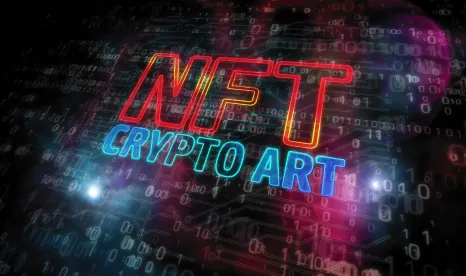As the world economy increasingly goes digital, innovators and existing market participants are finding new ways to tokenize assets and expand upon their uses. The exponential growth of non-fungible tokens (NFTs) has stimulated interest in tokenizing many types of assets. An NFT is a digital certificate of ownership of or rights to a unique asset, ownership of which is recorded on a blockchain. NFTs have commonly been used to represent digital art, photos, videos, audio files, collectibles, game items, tickets, and other digital assets. However, they can be used to represent virtually any digital or physical asset as well as entitlements (e.g., tickets, subscriptions, exclusive access, etc.).
Whether you are a game company contemplating tokenized virtual goods, an artist looking to tokenize digital art, or a brand owner looking to jump into digital fashion or other types of NFTs, there are potential legal issues of which you should be aware. Tokenization can implicate several U.S. laws, including those related to licensing, securities, anti-money laundering, sanctions, intellectual property, gambling, and others. Below is an overview of some of the potential legal issues with NFTs.
Sample Legal Issues with NFTs
-
Ownership/License Rights—Ownership and license rights are threshold issues with NFTs. Typically, the buyer owns the token but may only receive a license to the asset represented by the token (e.g., if it is a form of digital media). Typically, the asset creator will retain copyright in the asset. Various license terms can be applied, ranging from personal, and non-commercial rights to broad commercialization rights. Whatever your desired business model, the rights that are being granted to the buyer should be clearly and accurately communicated in both marketing communications and the license terms. Inaccurate marketing that, for example, suggests a buyer “owns” an asset to which they only have a limited license may give rise to various legal claims and other issues. License terms should delineate rights and clearly specify what a buyer can and cannot do with their purchase. It is also important to ensure that there is affirmative acceptance to have a valid contract.
-
Intellectual Property Rights Clearance—If you are minting an NFT for a digital asset that includes content (e.g., artwork, music, or video clips) or trademarks that you do not own or have a valid license to use, you may be liable for infringing third-party intellectual property. If you do not have the necessary rights to the intellectual property that is used in your NFT, you do not have the right to grant to the purchaser of your token either. If you misstate the rights that are being conveyed in connection with the sale of your NFT, you may be subject to additional claims. Exchanges or platforms that sell or display digital assets that incorporate third-party copyrights or trademarks, even unknowingly, can also face IP lawsuits.
-
Securities law—Most NFTs that represent only a unique asset and have a single owner are not likely to be securities. However, under some circumstances, they may. An NFT can be subject to U.S. securities law if it has security-like features or otherwise meets the Howey test: specifically when there is an investment of money or another type of consideration in a common enterprise with a reasonable expectation of profits to be derived from the efforts of others. A case-by-case Howey analysis is crucial to determining whether a particular NFT is a security. However, depending on the facts, NFTs may implicate securities laws where:
-
NFTs represent presales of digital assets intended for use on a platform that is not yet built and the proceeds of the sale are used to build the platform;
-
There is “pooling” or “fractionalization” of digital assets (e.g., art where artists pool assets and share revenues and/or where multiple NFTs represent fractional ownership of an asset by multiple investors);
-
NFTs represent a license to a digital asset (e.g., a song) and a share of the revenue from the asset (e.g., a percentage of sales).
-
-
Anti-Money Laundering—In some cases, NFTs (particularly high-value ones) can be used to facilitate money laundering. The U.S. Department of the Treasury published a study on the facilitation of money laundering and terrorist financing through the art trade. Among other considerations, the study discussed the risks of financial crimes in connection with digital art and NFTs. The study found that the high-value art market has certain inherent qualities that make it potentially vulnerable to a range of financial crimes
-
OFAC/Sanctions—NFT sales must also comply with sanction restrictions. These include transactions with specially designated nationals and blocked persons (SDNs) involving works valued over $100,000. Recently, the Treasury Department’s Office of Foreign Assets Control (OFAC) sanctioned a Latvia-based exchange, Chatex, its associated support network, and two ransomware operators for facilitating financial transactions for ransomware actors. In total, OFAC designated Chatex and 57 cryptocurrency addresses (associated with digital wallets) as SDNs. This is the first time NFTs have been publicly impacted as “blocked property” – as one of the designated cryptocurrency addresses owns non-fungible tokens (NFTs). Because U.S. persons are essentially prohibited from transacting with the individuals and entities associated with the designated cryptocurrency addresses, dealing in those NFTs is prohibited for U.S. persons as well.
-
Gambling—To the extent players pay for a chance to win an NFT, and the NFT can be freely traded on a secondary market, they may be deemed a “thing of value” and potentially implicate gambling issues. One example of where NFTs may be used this way is with blockchain games. The increased use of chance-based mechanics in games (e.g., lootboxes, social casino games) has led to growing scrutiny under gambling laws and more class-action lawsuits. Many traditional game publishers have prevailed in gambling lawsuits filed against them because their terms of service grant only a license to use the in-game currency and game items in the game and prohibit their sale, transfer or exchange. In these cases, courts have typically found that these in-game currencies and items are not a thing of value for gambling purposes. This basis may not apply to NFTs where game companies promote the true ownership and ability to sell cryptocurrency and NFTs via secondary markets. This is one reason that many blockchain-based games use less chance-based mechanics and more play-to-earn or user-generated content business models.
-
NFT insider trading policy—Companies creating NFTs and marketplaces selling NFTs should adopt an NFT insider trading policy. There have been recent high-profile incidents of employees and executives at NFT companies and marketplaces engaging in activity that may be deemed unfair or illegal. These incidences create undesired press for these entities. NFT insider trading policies often prohibit the purchase of NFTs based on material, non-public information. They also prohibit various types of trading in company NFTs that are designed to improperly manipulate the perceived price or trading volume of such NFTs.
Conclusion
With the proper advice of counsel, the vast majority of NFTs created by reputable companies can easily comply with the relevant laws and steer clear of these and other legal issues. It is important to work with an attorney who understands the legal issues that can arise with NFTs and who can identify and counsel you on the relevant legal issues based on the specific facts of your NFT. The attorney can also draft a license for your NFT based on your business choices and draft a custom NFT insider trading policy for the NFTs related to your company.




 />i
/>i

